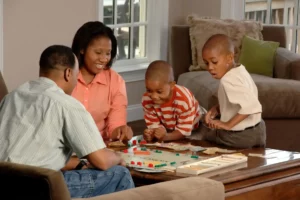It’s a truth that remains both difficult and necessary to confront: for Black families, navigating the world involves a distinctive set of challenges born from the shadows of systemic racism and socio-economic disparities. However, amidst these complexities, there’s a beacon of hope and healing – therapy. In this blog, we’ll delve into the often-overlooked importance of therapy for Black families. We’ll explore the role of a therapist in aiding a black family to overcome these unique challenges, and also, offer insights on how to find a therapist who can truly empathize with these experiences.
Contents
What Are The Challenges That Black Families Face?

Black families face a unique set of challenges that stem from long-standing systemic racism and social inequality. These obstacles, unfortunately, permeate every aspect of life, adding layers of complexity and stress that can significantly impact mental health and family dynamics.
Social Inequality and Discrimination
One of the primary challenges is the persistent social inequality that Black families encounter. This inequity spans across areas such as education, employment, housing, and healthcare. Discriminatory practices often put Black families at a disadvantage, creating stressful situations that affect their emotional and psychological well-being.
Racial Trauma
Racial trauma, or race-based stress, is another significant challenge. This can arise from direct experiences of racial discrimination, racial profiling, and microaggressions. Indirect exposure, such as hearing about racial violence or negative racial events, can also contribute to this trauma. The constant onslaught of these experiences can lead to severe psychological symptoms similar to post-traumatic stress disorder.
Economic Disparities
Economic disparities also pose a significant challenge. Black families are disproportionately affected by poverty due to systemic racism and discrimination, affecting access to quality education, healthcare, and secure housing. These conditions can create a cycle of stress and anxiety, with mental health often taking a severe hit.
Access to Mental Health Care
Despite the increased need for mental health support, Black families often struggle with accessing these services. This may be due to a lack of culturally competent care, stigma associated with mental health within the community, or financial constraints.
Representation and Cultural Stigma
A lack of representation in media and society can also pose challenges, leading to feelings of marginalization and invisibility. Coupled with the cultural stigma often associated with seeking therapy in Black communities, these obstacles can further deter families from seeking the help they need.
These challenges are multifaceted and deeply rooted in societal structures, requiring nuanced understanding and targeted intervention.
How Therapy Can Help You Overcome These Challenges?
 Therapy can offer a plethora of benefits to Black families navigating the challenges we’ve discussed. Here’s how:
Therapy can offer a plethora of benefits to Black families navigating the challenges we’ve discussed. Here’s how:
- Safe Space for Expression: Therapy offers a safe, judgment-free zone where individuals and families can express their feelings, fears, and experiences. This allows them to process complex emotions related to racial trauma and discrimination.
- Coping Mechanisms: Therapists equip families with effective coping strategies to deal with stressors. These can range from mindfulness techniques and stress management tactics to methods for reshaping harmful thought patterns.
- Healing Racial Trauma: Therapists who understand the dynamics of racial trauma can help families navigate these experiences, encouraging the processing and healing of these deep-seated wounds.
- Improving Communication: Therapy can improve family dynamics by enhancing communication. Therapists can mediate conversations, fostering a better understanding and empathy among family members.
- Self-Esteem and Empowerment: By validating experiences and feelings, therapists can boost the self-esteem of individuals and families, empowering them to better confront challenges.
- Mental Health Management: For those dealing with mental health conditions such as anxiety, depression, or PTSD, therapists provide crucial support and treatment strategies.
- Crisis Intervention: In times of acute crisis, therapists provide immediate intervention, helping families manage the situation effectively and safely.
Each of these aspects intertwines to form a comprehensive support system, equipping Black families with the tools and resilience to better navigate their unique challenges.
The Role Of A Therapist In Helping Families

When it comes to providing support to Black families, therapists play an essential role in several critical ways:
Providing a Safe Space
First and foremost, a therapist offers a safe space for Black families to express their fears, anxieties, and experiences without fear of judgment or reprisal. This platform allows for open discussion about personal experiences of racism, discrimination, and systemic oppression, offering a much-needed outlet for feelings that may otherwise go unexpressed.
Developing Coping Mechanisms
Navigating the challenges of racial trauma and discrimination can be overwhelming. Therapists aid in developing effective coping mechanisms that can provide a sense of control in stressful situations. These strategies can include anything from mindfulness techniques to exercises in cognitive restructuring, all aimed at helping manage responses to stress.
Unpacking Trauma
A crucial aspect of a therapist’s role is assisting Black families in unpacking trauma related to racial experiences. This involves breaking down complex emotions, understanding the roots of this trauma, and devising therapeutic strategies for processing these experiences in a healthy manner.
Empowerment and Validation
In addition to helping individuals and families understand their emotions, therapists provide validation, affirming the reality of the challenges Black families face. This validation is not only healing but empowering, boosting confidence and self-esteem.
Improving Family Dynamics
Therapists can also play a vital role in improving family dynamics, particularly in the context of racial stressors. By facilitating open communication, mediating disputes, and teaching empathy, therapists can help foster healthier, stronger relationships within families.
Offering Professional Guidance
With their professional expertise, therapists can guide Black families towards additional resources and supports as needed. This might include linking families to community programs, educational resources, or psychiatric care if necessary.
In these ways, a culturally competent therapist provides invaluable support to Black families, helping them navigate and overcome the unique challenges they face.
Which Technique Is Used During The Therapy?
 The therapy technique used can vary greatly depending on the therapist and the unique needs of the Black family in question. Here are some common therapy techniques that could be employed:
The therapy technique used can vary greatly depending on the therapist and the unique needs of the Black family in question. Here are some common therapy techniques that could be employed:
- Cognitive-Behavioral Therapy (CBT)
CBT is a common therapeutic approach that aims to change harmful thought patterns, behaviors, and emotional responses. This technique can be particularly useful for addressing trauma, anxiety, depression, and other mental health conditions.
- Family Therapy
Family therapy involves multiple family members in therapy sessions. It aims to improve communication, resolve conflicts, and foster a healthier family dynamic. It’s especially beneficial when family-wide challenges are present.
- Trauma-Focused Therapy
For Black families dealing with racial trauma, trauma-focused therapies, such as Trauma-Focused Cognitive Behavioral Therapy (TF-CBT) or Eye Movement Desensitization and Reprocessing (EMDR), can be particularly useful.
- Mindfulness-Based Techniques
Mindfulness-based techniques teach individuals to focus on the present moment, which can help reduce anxiety and stress. Techniques can include meditation, deep-breathing exercises, and guided imagery.
- Psychoeducation
Psychoeducation involves teaching individuals about their mental health conditions and ways to cope with them. For Black families, this can also include education on racial trauma and systemic racism.
- Psychodynamic Therapy
Psychodynamic therapy focuses on unconscious processes and how they influence current behavior. It helps individuals understand their past and its impact on their present, which can be helpful in understanding intergenerational trauma.
The therapeutic approach will depend on the specific therapist’s skills and the needs and preferences of the family. It’s important to discuss potential therapeutic techniques with your therapist to find the approach that feels most comfortable and beneficial for your family.
How to Find the Right Black Therapist Near Me
 Locating a suitable therapist, especially one who understands the unique challenges of Black families, may feel daunting. Here are some strategies to guide your search:
Locating a suitable therapist, especially one who understands the unique challenges of Black families, may feel daunting. Here are some strategies to guide your search:
- Identify Your Needs: Firstly, establish what you’re looking for in a therapist. Is it someone who specializes in racial trauma? Family therapy? Mental health conditions like depression or anxiety? Clarifying this can help you narrow down potential therapists.
- Cultural Competence: Look for therapists who exhibit cultural competence, showing a deep understanding and respect for your experiences as a Black family. They should demonstrate empathy and be equipped to navigate issues related to race and racism.
- Ask for Recommendations: Reach out to trusted individuals in your life who may have therapist recommendations. This could be friends, family members, healthcare providers, or community leaders.
- Check Online Platforms: Many websites and apps can connect you with therapists in your area. Look for platforms that allow you to filter by specialties, including racial trauma and cultural competence.
- Read Reviews: If available, read through reviews or testimonials from previous clients. These can provide a glimpse into the therapist’s style, competence, and empathy.
- Schedule a Consultation: If possible, arrange a consultation meeting or call with potential therapists. This can give you a sense of whether you feel comfortable with them and if their approach aligns with your family’s needs.
- Insurance and Costs: Verify if the therapist accepts your insurance and understand their fees. Therapy should not add a financial burden, so seek out therapists within your budget or those who operate on a sliding scale based on income.
Finding the right therapist can take some time and effort, but the investment is worth the potential benefits to your mental health and overall well-being.
Conclusion
The unique set of challenges that Black families face, from racial trauma to socio-economic disparities, can feel insurmountable at times. Yet, amidst these hurdles, therapy stands as a powerful tool for healing, growth, and resilience.
A therapist provides a safe space for a Black family to express their experiences, feelings, and fears. They equip these families with coping mechanisms, assist in unpacking racial trauma, and play a vital role in improving family dynamics. Moreover, finding a culturally competent therapist, someone who truly understands and empathizes with the specific challenges of a Black family can make a world of difference.
And if you are also looking for a family therapist, at CoupleMantra our experienced therapists are here to provide you the support and tools you need to heal, grow, and thrive together. Book a trial Online Couple Counseling


